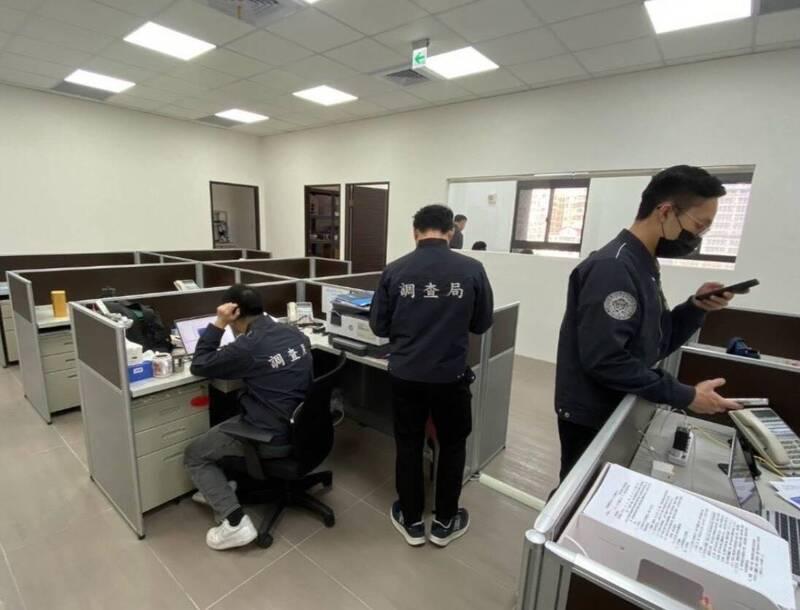Separate investigations into two Chinese semiconductor companies, Ark Semi (艾科微電子) and Kimtigo (金泰克半導體), found they used third-party investments and poached local tech talent to illegally establish research and development (R&D) centers in Taiwan, the Hsinchu District Prosecutors’ Office said today.
Searches of the companies’ offices and employee residences on Wednesday and yesterday were led by the Ministry of Justice Investigation Bureau in Taipei, Taichung and Hsinchu.
The companies were found to have seriously impacted Taiwan’s semiconductor industry by leveraging Taiwanese expertise to advance Chinese enterprises, the office said.

Photo courtesy of the Investigation Bureau
Six suspects and seven witnesses were summoned for questioning, while officials seized internal documents, laptops and mobile phones as evidence, it said.
Five suspects were found to have contravened laws including Article 93-2 of the Act Governing the Relations Between the People of Taiwan and the Mainland Area (台灣地區與大陸地區人民關係條例), it said.
Chinese companies are prohibited from conducting operations in Taiwan without approval from the Ministry of Economic Affairs’ Department of Investment Review to protect domestic industrial competitiveness and economic interests, it said.
The five suspects were released on bail ranging from NT$300,000 to NT$400,000, it added.
Searches of Ark Semi’s Taiwan offices and employee residences were conducted in Taipei’s Nangang District (南崗) and Hsinchu County and City on Wednesday, headed by Hsinchu prosecutor Wang Yuan-chih (王遠志), it said.
Four suspects and two witnesses were brought in for questioning, with three suspects released on bail, it said.
Separate searches into Kimtigo offices and employee residences were conducted yesterday in Taichung and Hsinchu, led by prosecutor Liao Chi-tsun (廖啟村), it added.
Two suspects and five witnesses were summoned for questioning, with the two suspects deemed to have committed serious offenses and released on bail of NT$300,000 each, it said.

The Ministry of Economic Affairs has fined Taobao NT$1.2 million (US$36,912) for advertisements that exceed its approved business scope, requiring the Chinese e-commerce platform to make corrections in the first half of this year or its license may be revoked. Lawmakers have called for stricter enforcement of Chinese e-commerce platforms and measures to prevent China from laundering its goods through Taiwan in response to US President Donald Trump’s heavy tariffs on China. The Legislative Yuan’s Finance Committee met today to discuss policies to prevent China from dumping goods in Taiwan, inviting government agencies to report. Democratic Progressive Party Legislator Kuo Kuo-wen (郭國文) said

The Ministry of Economic Affairs has fined Taobao NT$1.2 million (US$36,900) for advertisements that exceeded its approved business scope and ordered the Chinese e-commerce platform to make corrections in the first half of this year or its license would be revoked. Lawmakers have called for stricter supervision of Chinese e-commerce platforms and more stringent measures to prevent China from laundering its goods through Taiwan as US President Donald Trump’s administration cracks down on origin laundering. The legislature’s Finance Committee yesterday met to discuss policies to prevent China from dumping goods in Taiwan, inviting government agencies to report on the matter. Democratic Progressive Party

Taiwan and its Pacific ally Tuvalu on Tuesday signed two accords aimed at facilitating bilateral cooperation on labor affairs, according to Taiwan’s Ministry of Foreign Affairs (MOFA). The governments inked two agreements in Taipei, witnessed by Foreign Minister Lin Chia-lung (林佳龍) and visiting Deputy Tuvaluan Prime Minister Panapasi Nelesone, MOFA said in a news release. According to MOFA, the agreements will facilitate cooperation on labor issues and allow the two sides to mutually recognize seafarers’ certificates and related training. Taiwan would also continue to collaborate with Tuvalu across various fields to promote economic prosperity as well as the well-being of their

Sung Chien-liang (宋建樑), who led efforts to recall Democratic Progressive Party (DPP) Legislator Lee Kun-cheng (李坤城), was released on bail of NT$80,000 today amid outcry over his decision to wear a Nazi armband to questioning the night before. Sung arrived at the New Taipei District Prosecutors’ Office for questioning in a recall petition forgery case last night wearing a red armband bearing a swastika, carrying a copy of Adolf Hitler’s Mein Kampf and giving a Nazi salute. Sung left the building at 1:15am without the armband and covering the book with his coat. Lee said today that this is a serious